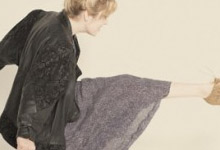
Tracks
Twin Sister: "Bad Street"
(2011)
By Brian Riewer | 21 August 2011
Wallowing in my sorrow in this post-Women indie universe, I damn near slept on Twin Sister, a band that in many ways carries on the torch that the Calgary quartet lit. They don’t quite sound the same or even remotely similar, Women having dealt in noise in contrast to Twin Sister’s twee, but in their engorging of everything that music has to offer in one casual uncanny pass the two are brethren (or, rather, sistren) in the way they build and cement their respective styles together.
Throughout last year’s Color Your Life EP Twin Sister stringed subgenres indie rock and beyond into their dream pop aesthetic, but never in a manner that suggested itself outright; it required a bit of prying, a handful of attentive listens more than the music would suggest because they made it all sound so normalized, so convincingly conventional while being so decidedly not. A focused ear can pick up on the silent revolution Twin Sister is constructing under the surface—their pulling ’80s buddy cop bass lines out under floating A Sunny Day in Glasgow vibes on “All Around and Away We Go”; dragging noir pulses out of “Lady Daydream” in a way that makes it equally as fitting for Wu-Tang’s uses; approximating a dolled-up Portishead in lace and pastels on “Milk & Honey”—while being equally as appreciative of how easy it is to overlook such things and how convenient they make it to simply listen to their music. The “Women effect,” if you will.
“Bad Street” sees the group ditching dream pop and wiping the sleep out of their eyes, embracing the funkiness they’ve only coyly hinted at before and taking it in a direction reminiscence of Brian Eno-era Talking Heads. But again they do so subtly, in an arching move that slowly slips past its listeners’ awareness so that by the end they wonder just how they’ve gotten there. Singer Andrea Estella, who seems to have lost much of the throatiness in her voice since Color Your Life, coaxes us into familiar territory with her welcoming elongated tones and sparse drum and bass instrumentation not entirely unlike the verses of “All Around and Away We Go.”
The transformation comes between the first and second verse, as the repeated line “I want it bad” starts looping over and over under Estella’s second verse. It’s quiet at first, only a tittering whisper behind another pleasantly receptive verse, but it grows precipitously to dominate the entire song—not just the line itself, but the change it is demanding. The insistent appeal for badness comes front and center after second verse and after a short instrumental lull the band reacts in kind, doubling their pace and offering responses to each of Estella’s inquiries that had previously been left hanging. Not enough, though: Estella again requests that they “make me a promise ‘cause I, I want it bad” and upon this the song climaxes, with her vocals previously introduced layered over all of the instrumental elements heretofore used crescendoing at once, a move Talking Heads used prodigally through the first half of Remain in Light (1980). It then shutters to much the same place it began, the steady continuous percussion, a tinkering bass line, and Estella intoning in a much, well, badder tone than she started out with, “Bad house, bad street / Big hands, big feet / Got a car, beep beep / Bad boy, bad streak,” etc., in a situation and lyrical style one could very easily imagine David Byrne shouting wildly.
Still the Talking Heads analogy doesn’t work completely, as their style was far more aggressive, and their peaks easy to see coming from a mile off. In this regard “Bad Street” is tectonic and Women-esque, in that the acme happens naturally and suddenly, and that you don’t notice the signs until the earthquake has already hit you and the devastation is already taking place. If “Bad Street” is any indication of what the rest of their debut is like, then Chris’s fears of a Voxtrot-like flop appear to be unfounded. No, now we’re only hoping there are no on-stage fist fights and subsequent break-ups written in their future.





